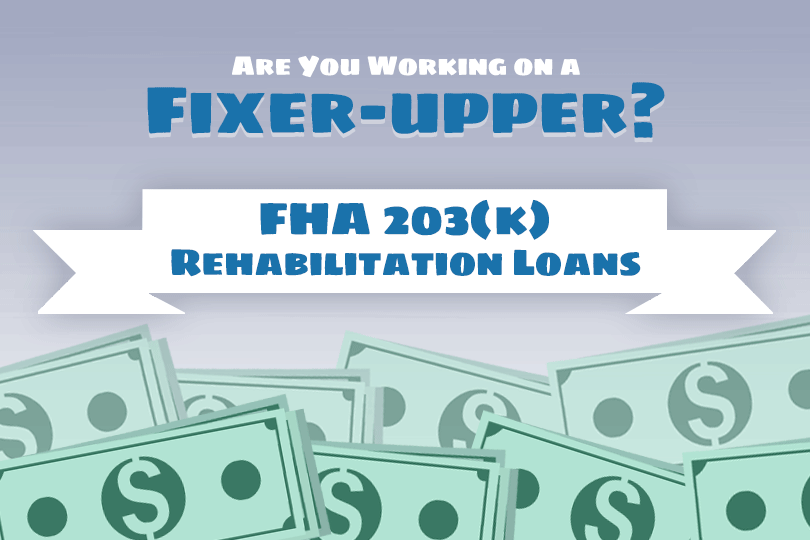FHA Programs for Fixer-Upper Homes
November 8, 2022
The FHA 203(k) Rehabilitation Loan
The fact is that repairs and renovations to your home cost a lot of money. Luckily, the FHA has an option for those with fixer-uppers on their hands. The FHA 203(k) Rehabilitation Mortgages allows borrowers to finance the funds for renovations to a home. This loan program can be used for purchasing a home, and if can also be secured as a refinance if you already have a mortgage on it.
In the case of a home purchase, the loan covers the purchase as well as the rehabilitation of the home, as part of a single mortgage. This loan can be used to finance a property that is at least one year old. Part of the funds go toward paying the seller, and the rest is placed in an escrow account, disbursed as rehabilitation goes on.
Additionally, the refinance option is not exclusively for FHA borrowers. If you need funds for renovation on a home you are currently paying off with a conventional mortgage, you can refinance to the FHA 203(k) Rehabilitation Mortgage.
The FHA Rehabilitation Loan comes with all of the flexible borrower guidelines that the FHA offers on its other mortgage and refinance programs. However, there are a few other factors that come into play. To qualify for an FHA Rehab Loan, the total cost of repairs must amount to at least $5,000. The FHA Loan Limits still apply, so the total value of the property must fall within the lending limits for that area. With Rehabilitation Loans, the property value is determined by whichever is less:
- The home’s value before rehabilitation plus the calculated cost of repairs, or
- 110% of the appraised value of the property after repairs.
There are some remodeling projects that aren’t as extensive as others. You may not need an entire home loan to afford the renovations you have in mind. In that case, there is a “limited” version of the 203(k) Rehab Loan that lets you borrow without committing to the full mortgage. FHA's Limited 203(k) program lets borrowers finance up to $35,000 for renovations.
To qualify for the limited version of the FHA Rehab Loan, the renovations need to meet some requirements. Here are some of the factors that disqualify a borrower:
- The renovation timeline is expected to be six months or more.
- The project requires more than two payments per specialized contractor.
- The required repairs in the appraisal require a consultant to develop a specification of repairs.
- The repairs require plans or architectural exhibits.
You may also be able to combine the FHA 203(k) Rehab Loan with other FHA programs, such as the FHA Energy-Efficient Mortgage option. Ask your lender about these add-ons, and see what the best course of action is for you and your home!
------------------------------
RELATED VIDEOS:
Disclosures Give Transparency to Borrowers
Understanding the Purpose of Your Mortgage Down Payment
Putting Money Into Your Escrow Account

FHA Loan Articles
November 21, 2024The dream of homeownership is with some from a young age. But in an uncertain housing market, some grapple with the question: Is buying a home the right move for me?
While renting offers relocation flexibility and lower upfront costs, homeownership provides a wealth of financial and personal benefits.
November 20, 2024Refinancing your mortgage offers a way to cash in on your home equity, potentially reduce your interest rate, or modify your loan term. Borrowers ready to consider have options including FHA loans and conventional loans.
While both provide avenues for refinancing, each loan type may be best for specific needs and financial circumstances. What are the differences between FHA and conventional refinance options?
November 14, 2024The home you want to buy might seem perfect, or it may have a few flaws that are acceptable in the grand scheme of things. But what about issues you can’t spot just by walking through the property a few times? A home inspection provides an unbiased, expert assessment of the property's condition, uncovering potential issues that might not be noticeable to the untrained observer.
November 12, 2024Escrow is an important feature of most typical FHA loans. An escrow account is a third-party account where borrowers deposit funds designated for property taxes and other uses. Requirements to use escrow accounts typically stems from a need to protect all parties involved in the transaction
November 2, 2024When it’s time to consider buying a home, the Federal Housing Administration (FHA) offers two popular options. One is the traditional FHA purchase loan many use to buy a house in the suburbs. But not everyone wants to buy an existing property. Some want more control over the design and configuration of the home.
The other FHA construction loan option, the one-time close mortgage, comes in here. This option is for those who want to approve floor plans, have a say in the types of materials used to build the home and choose its features.







